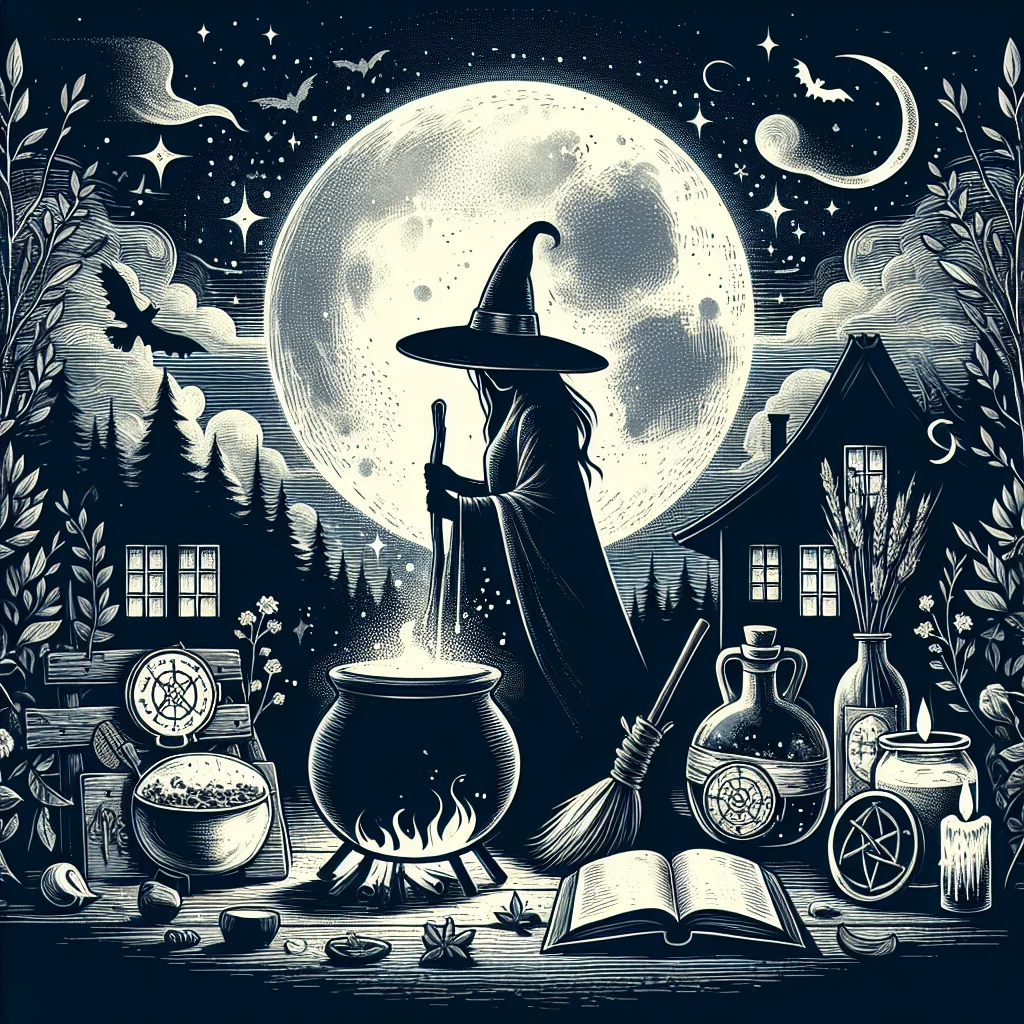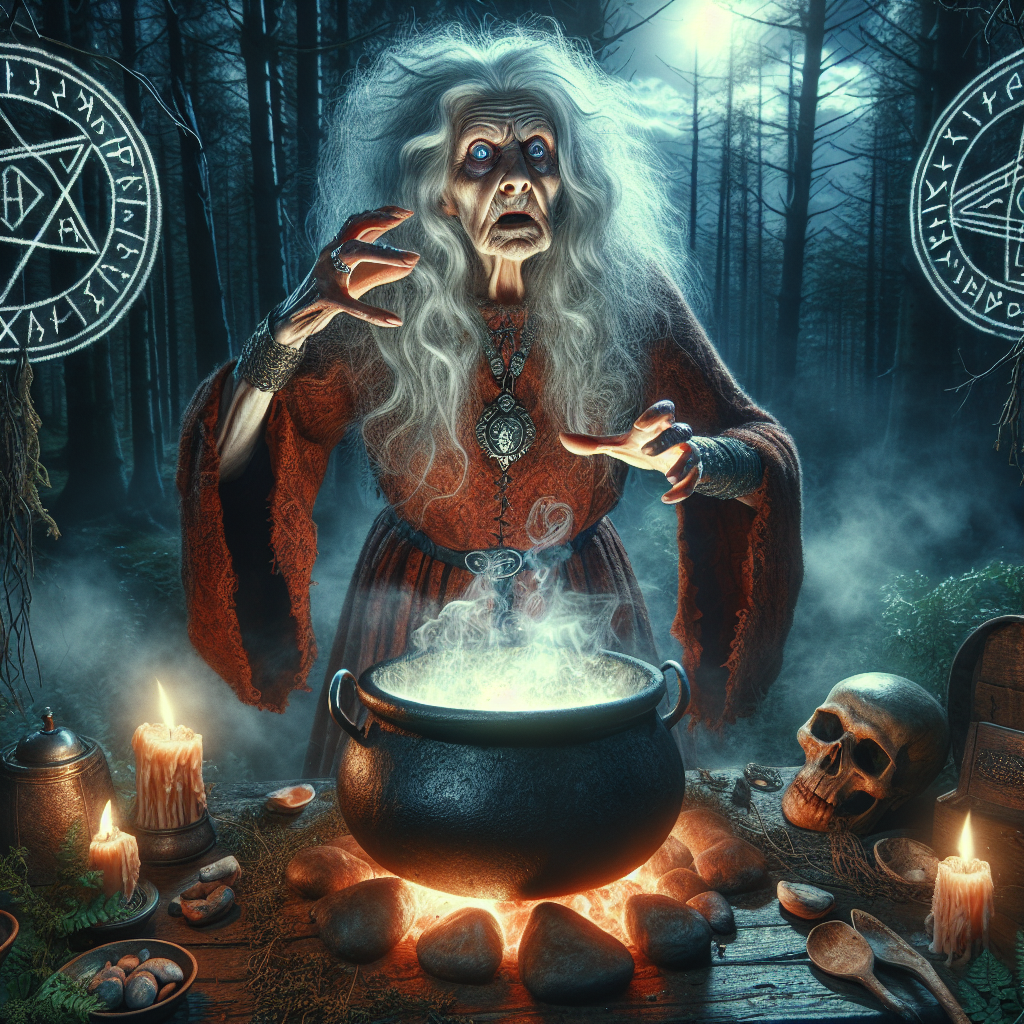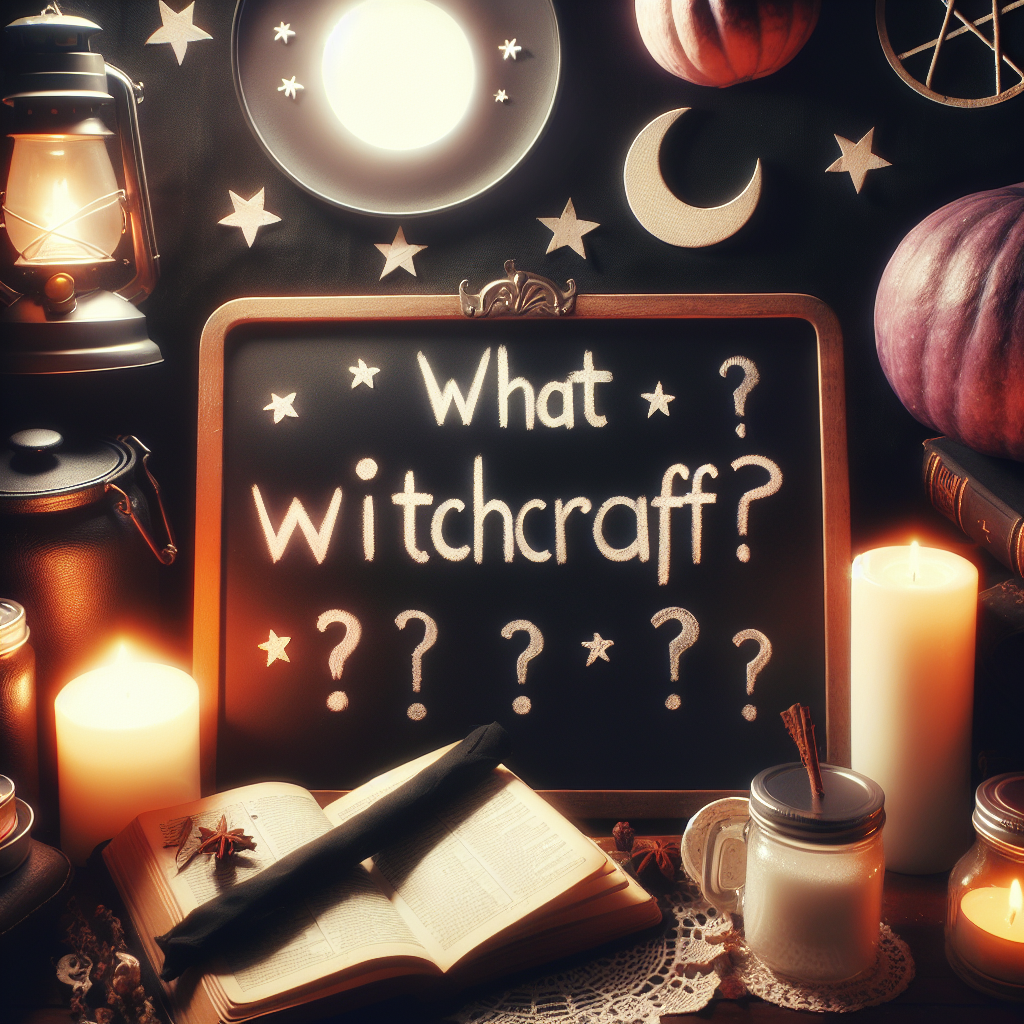As an Amazon Associate I earn from qualifying purchases.

Witchcraft, often linked with the mystical and the enigmatic, has captivated human imagination for centuries. While modern interpretations may vary, the traditional definition of witchcraft revolves around the practice of magical abilities and techniques to influence the natural world, typically involving rituals and spells. Historically perceived as a malevolent force throughout various cultures, those accused of witchcraft have often been subjected to persecution and trial.
Tracing its roots back to prehistoric times, witchcraft has been recorded in the earliest human civilizations. Ancient texts and artifacts suggest that the practice was once an integral part of religious and cultural life, serving as a means to explain the unexplainable, fulfill human desires, and enact supposed divine or supernatural powers. Over time, the interpretation of witchcraft diverged – revered in some cultures, while elsewhere it became synonymous with evil and was condemned by religious institutions, particularly during the European witch hunts of the 14th to 17th centuries.
Today, witchcraft has been redefined yet again. In contemporary society, it is often associated with neopagan religions like Wicca, where practitioners, also known as Wiccans, view it as a benign, nature-based faith that honors the Earth and its cycles. Interestingly, the Pew Research Center found that in the United States, roughly 0.4% of the population identify as Wiccans or pagans, signifying a resurgence of interest in alternative spiritual paths and the rebranding of witchcraft in the new millennial mindset.
Witchcraft in popular culture has further shaped public perception. Literature, film, and television often portray witches as either villainous or heroic figures, deeply influencing how society views the concept. Magic and witchcraft-themed entertainment have not only sparked interest but have also led to the commercialization of the practice, with the market seeing a rise in the sale of witchcraft-related paraphernalia. Despite its controversial past and the varying views that exist today, witchcraft continues to fascinate and provoke dialogue about spirituality, power, and the unknown forces of the universe.
“`html
What is the Definition and Meaning of Witchcraft? Exploring Various Interpretations
“`
Witchcraft, a term often shrouded in mystery and misconceptions, generally refers to the practice of, and belief in, magical skills and abilities that are able to influence the physical world. It is a complex and multifaceted concept that varies across different cultures and historical contexts. Typically associated with the use of supernatural or preternatural powers, witchcraft has been both revered and reviled throughout history. The definitions of witchcraft can range from the traditional image of witches engaged in spellcasting and potion-making, to more modern interpretations that view it as a nature-based pagan religion or as a metaphor for personal empowerment. In exploring the myriad approaches to understanding witchcraft, one can discover rich cultural traditions, varied religious perspectives, and an evolving narrative that both reflects and challenges contemporary social norms. Delve deeper into the fascinating details and historical evolution of witchcraft as we peel back the layers of its definitions and interpretations in the following discussion.
Witchcraft refers to a spectrum of beliefs, practices, and rituals associated with the use of supernatural powers or magic for various purposes. It has been a part of human culture for thousands of years and spans many different societies and traditions, each with its unique definition and interpretation. What witchcraft means can vary greatly depending on the cultural, religious, and social contexts.
Historical and Anthropological Perspectives
Historically, witchcraft has often been understood in the context of pre-Christian religious practices in Europe, where it was associated with both malevolent and benevolent magic. Throughout the Middle Ages and into the Renaissance, witchcraft was increasingly seen through a Christian lens as heretical and linked to devil worship. This interpretation led to the infamous witch trials, where accusations of witchcraft could lead to severe punishment or execution.
In anthropology, witchcraft is studied as a cultural phenomenon that can offer insights into social dynamics, belief systems, and power structures within communities. Many anthropologists consider witchcraft a form of explanatory system that communities use to make sense of unexplainable events, misfortunes, or illnesses. It serves as a way to understand and navigate the unseen and misunderstood forces believed to influence the physical world.
Contemporary Definitions
In contemporary times, witchcraft means a range of things to different people. For some, it is a spiritual path that embraces pre-Christian, pagan, or nature-based beliefs and rituals. Followers of Wicca, for example, see it as a religion that honors the divine in its feminine and masculine aspects and practices rituals that revolve around the natural cycles of the Earth.
For others, witchcraft is more of a secular practice focused on self-empowerment and the use of ritual and intention to effect personal or social change. This can include practices such as meditation, herbalism, and the casting of spells, which are thought to harness personal and environmental energies to bring about a desired outcome.
Cultural Variations
The meaning of witchcraft varies significantly across cultures. In many African societies, witchcraft is often understood in terms of spiritual attacks by malevolent individuals, and counter-practices are widespread for protection and healing. In Latin American cultures, practices like brujería (which translates to “witchcraft”) combine indigenous, African, and European elements and are used for healing, protection, and sometimes for harm.
Legal Standpoint
From a legal standpoint, many modern societies no longer punish witchcraft as a crime. However, there are still places where accusations of witchcraft can lead to social ostracism, violence, or even death. The legal definition of witchcraft, where it exists, often hinges on accusations of practicing harmful magic, which can be difficult to prove or define.
Challenges and Misunderstandings
One of the challenges in defining what witchcraft means is the abundance of stereotypes and misconceptions, largely stemming from historical fear-mongering and popular culture. Witches have often been depicted as evil or dangerous figures, a portrayal that ignores the benign and beneficial aspects of witchcraft as understood and practiced by many.
Statistical Insights
Despite the variations and controversies surrounding witchcraft, its presence in popular culture and spiritual practice is notable. According to the Pew Research Center, Wicca and other pagan religions significantly grew from an estimated 8,000 practitioners in 1990 to about 340,000 practitioners in the United States as of 2008. This growth points to an increasing interest and reevaluation of what witchcraft means in modern society.
1. What is the basic definition of witchcraft?
Witchcraft generally refers to the practice of, and belief in, magical skills and abilities that are able to be exercised individually, by designated social groups, or by persons with the necessary esoteric secret knowledge. It is a complex and multifaceted term that varies culturally and societally.
2. Is witchcraft always associated with evil or negative practices?
No, witchcraft is not inherently evil or negative. While some cultures may view it as malevolent, others consider it a natural, positive, or neutral force. Its moral alignment often depends on the intention of the practitioner and the societal context in which it is practiced.
3. Can witchcraft be considered a religion?
While witchcraft itself is not a religion, it is often a component of various religious systems. For example, Wicca is a modern pagan religion that incorporates witchcraft as part of its practice. However, not all individuals who practice witchcraft consider it to be a religious activity.
4. How do different cultures interpret witchcraft?
Different cultures have varied perspectives on witchcraft. In some traditions, it’s seen as a part of everyday life, involving folk healing and divination. In others, it may be associated with dark magic and feared. These cultural interpretations also evolve over time, influenced by social, religious, and political factors.
5. What is the historical context of witchcraft?
Historically, witchcraft has been present in many societies, often featuring in mythology and folklore. In Europe, the Witch Hunts between the 15th to 18th centuries reflected the fear and persecution of those accused of witchcraft. Today, historical interpretations of witchcraft have shifted, and it is often seen in a more positive light.
6. Are there different types of witchcraft?
Yes, there are many different types of witchcraft that vary by culture, geography, and perspective. These can include traditional folk magic, ceremonial magic, Wicca, shamanistic practices, and more. Each type has its own specific practices, rituals, and beliefs.
7. Can witchcraft be practiced by anyone?
In principle, yes, witchcraft can be practiced by anyone interested in learning its ways and respecting its principles. However, some traditions may have specific initiations or requirements, and certain knowledge may be passed down only within particular communities or lineages.
8. How is modern witchcraft different from historical witchcraft?
Modern witchcraft often emphasizes personal empowerment, connection with nature, and the use of magic for positive change. It is typically more eclectic and influenced by a range of spiritual traditions. Historical witchcraft, depending on the context, could be more homogeneous, sometimes secretive, and was often heavily stigmatized or misunderstood.
9. What role does nature play in witchcraft?
Nature often plays a central role in witchcraft, with practitioners drawing on natural energies, working with plant and animal spirits, and celebrating the cycles of the Earth. Nature is seen as a source of power and wisdom in many witchcraft traditions.
10. Is it possible to be a practitioner of witchcraft and still adhere to another religion?
Yes, it is possible to practice witchcraft while also adhering to another religion. Witchcraft does not necessarily require exclusive adherence and can be integrated with other religious beliefs. However, the compatibility depends on the individual’s beliefs and the tenets of their religion.

Conclusion
Witchcraft, as explored in the article, has numerous definitions and interpretations that vary across cultures, historical periods, and individual perceptions. At its core, witchcraft often encompasses the practice of magical skills, spells, and rituals that have the intent to influence physical, emotional, or spiritual realms. In some societies, witchcraft is seen as a benevolent force, associated with healing and protection, while in others, it is perceived as malevolent, linked to harm and ill will. The article underscores the duality of witchcraft, highlighting its capacity for both creative and destructive power, which is a reflection of the broader human condition.
The interpretations of witchcraft also change over time, adapting to the cultural and ethical standards of the period. What was once feared and persecuted, as in the witch trials of early modern Europe and colonial America, may now be embraced by modern practitioners who seek empowerment and a connection with the natural world. Additionally, the article pointed out the significance of witchcraft in symbolic and psychological terms, offering a mirror to societal fears and values, as well as providing a medium for personal expression and transformation. Through its multifaceted nature, witchcraft continues to captivate the human imagination, offering a window into the complexities of belief, power, and the supernatural in human society.
Amazon and the Amazon logo are trademarks of Amazon.com, Inc, or its affiliates.


